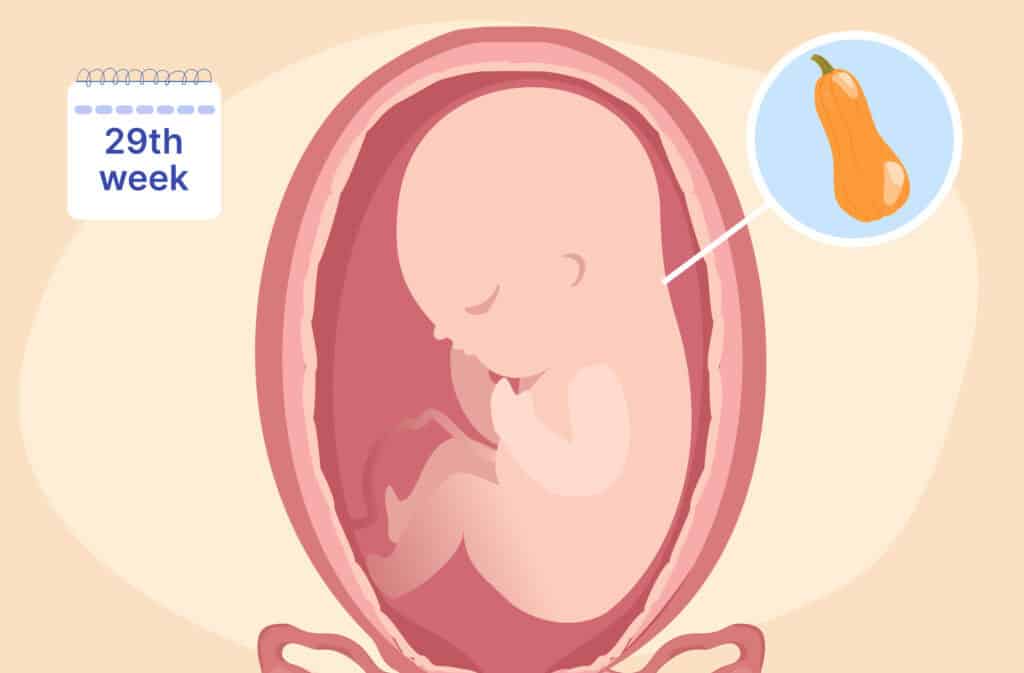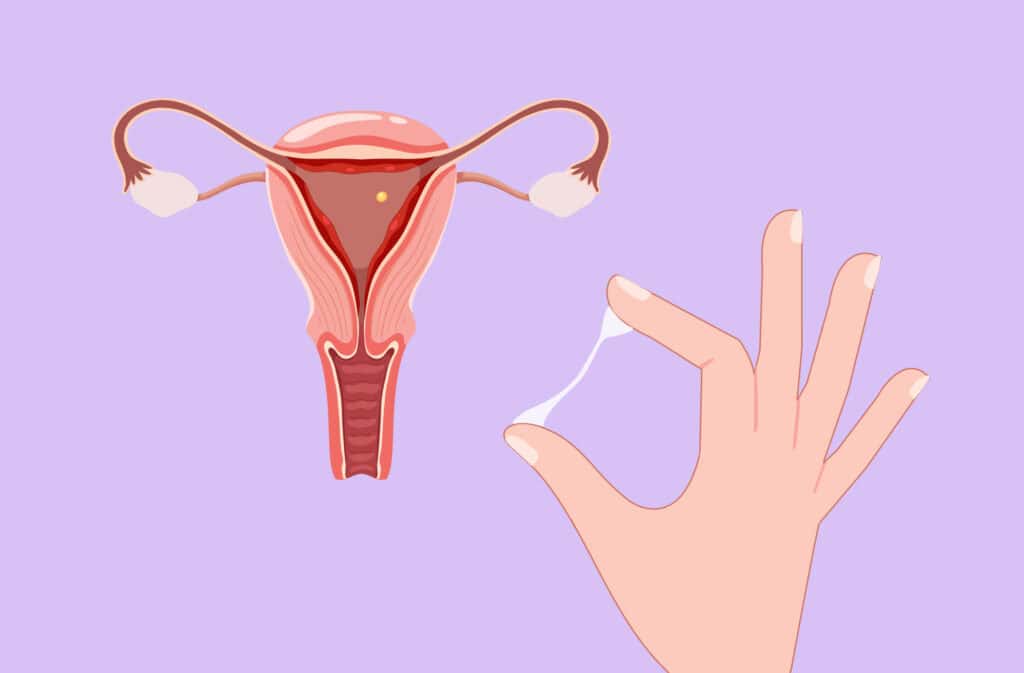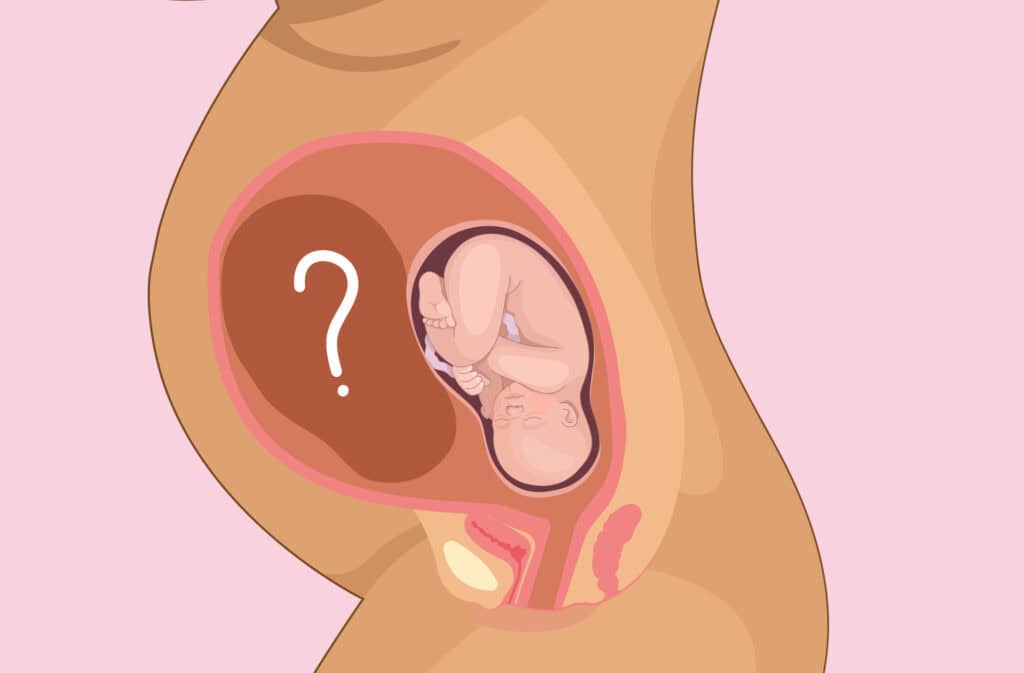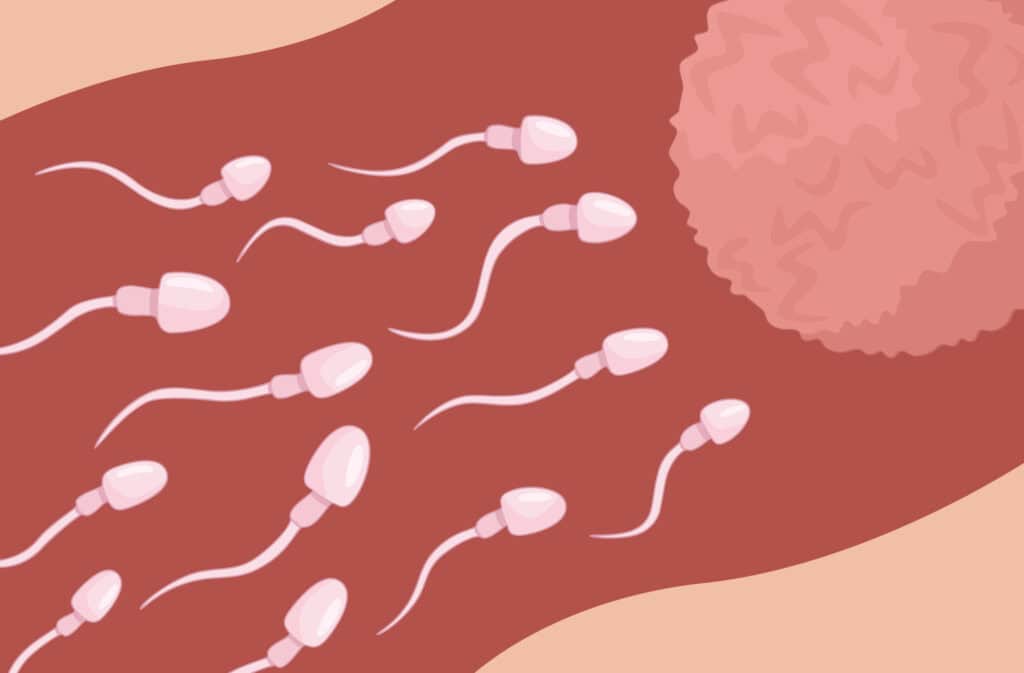Femia > Health Library > Pregnancy > Pregnancy week by week > 29 Weeks pregnant: Baby’s growth, symptoms, and preparation for labor
29 Weeks pregnant: Baby’s growth, symptoms, and preparation for labor

- Updated Feb 20, 2025
- Published
CRAFTED BY HUMAN
Crafted by human At Femia, we provide accurate and up-to-date information at every stage of your journey, from trying to conceive, pregnancy and postnatal support. All content is created by a real person based on in-depth research and own professional experience. Femia ensures that you will receive expert advice, strict accuracy and a personalized approach from our authors/medical experts. Learn more about our editorial policy.
FACT CHECKED
Fact checked At Femia Health, we maintain the highest standards of editorial excellence in delivering content focused on helping you conceive, guiding you through pregnancy, and supporting you postpartum. Explore our content review principles to learn how we ensure the accuracy and quality of our health and lifestyle tips for every stage of your journey.

Created with Hector Chapa, MD, FACOG, Clinical associate professor, Obstetrics and Gynecology Texas A&M University, College of Medicine in Bryan-College Station, USA
At 29 weeks pregnant, your baby is about the size of a butternut squash, developing their lungs, practicing movements, and preparing for life outside the womb. For you, the focus shifts to managing symptoms and identifying labor signs.
Welcome to week 29 of your pregnancy! At this stage, you’re well into your third trimester, with just over two months to go. You may notice more distinct symptoms, from Braxton Hicks contractions to changes in the baby’s position. Here’s everything you need to know about week 29 pregnancy, including baby development, symptoms, and preparing for labor.
With Femia, you will get personalized insights every step of the way
Pregnancy symptoms at 29 weeks
Here are common symptoms you may experience at 29 weeks:
Anemia
Iron is crucial during pregnancy, as it helps produce hemoglobin, which transports oxygen to cells. With the increased blood volume in your body during pregnancy, iron is essential for both you and your growing baby. Low iron can result in anemia, leading to symptoms like fatigue and weakness. To treat anemia, your provider may recommend iron supplements, and in severe cases, iron infusions might be needed. Severe anemia poses risks to both you and your baby, so your provider will monitor your iron levels through blood work during pregnancy.
Cramping
Cramping in the third trimester is often caused by round ligament pain, Braxton Hicks contractions, or constipation. These cramps can mimic menstrual pain but are generally mild. Drinking water, taking a warm bath, or doing gentle stretches can provide relief. However, severe or persistent cramping, especially with additional symptoms like fever or dizziness, could signal a serious issue like preterm labor or placental abruption. Contact your healthcare provider if your cramps don’t subside after rest, or if you experience other concerning symptoms.
Heartburn
Pregnancy hormones, particularly progesterone, relax the smooth muscle tissue in your gastrointestinal tract, leading to slower digestion and potential heartburn. Additionally, the growing uterus puts pressure on your stomach, exacerbating this issue. To reduce heartburn, try eating smaller meals, avoiding lying down immediately after eating, and staying hydrated by drinking water between meals. Propping yourself up with pillows at night can also help, and if the heartburn is persistent, consult your provider about safe medications for relief.
Lightheadedness
Pregnancy causes dramatic changes in your cardiovascular system, including increased blood volume and heart rate, which can occasionally result in dizziness or lightheadedness. This can be exacerbated by pressure from your growing uterus, which slows circulation. To prevent lightheadedness, stay hydrated, eat regularly, avoid overheating, and refrain from standing up too quickly. If dizziness persists or is frequent, or if you faint, reach out to your healthcare provider.
Dizziness
Dizziness during pregnancy is often due to the increased blood flow and pressure changes in your body. Your growing uterus can compress veins, slowing circulation to your lower half and causing lightheadedness. If you experience dizziness, avoid standing too long, get up slowly from a seated position, and take regular breaks to move around. If dizziness continues or worsens, contact your provider to ensure there is no underlying issue.
Sleeping problems
As pregnancy progresses, it becomes more difficult to find a comfortable sleeping position. This is due to the growing belly, pressure on your bladder, and physical discomfort. Try using pillows for support and practice good sleep hygiene. If sleep problems persist and affect your daily functioning, talk to your healthcare provider, as they might recommend relaxation techniques or safe sleep aids.
Weird pregnancy cravings
Many pregnant women experience weird cravings for unusual or specific foods, which can be caused by hormonal fluctuations or nutritional needs. While craving sweet or salty foods is common, some women crave non-food items, known as pica, such as dirt or chalk. Make sure to maintain a balanced diet despite these cravings, and try to focus on healthy snacks to meet your nutritional needs. If your cravings are interfering with your ability to eat a balanced diet or leading to nutritional deficiencies, talk to your provider.
Braxton Hicks contractions vs true labor
| Aspect | Braxton Hicks contractions | True labor |
|---|---|---|
| Frequency | Irregular, not progressively closer together | Regular intervals, getting closer together |
| Intensity | Weak, often described as mild discomfort | Increases in strength over time |
| Duration | Short, usually lasting less than 30 seconds | Longer, lasting 30-70 seconds per contraction |
| Location of pain | Felt mainly in the front of the abdomen | Starts in the back and radiates to the front |
| Effect of movement | Stops or decreases with activity or a change in position | Continues regardless of movement or position changes |
| Cervical changes | Does not cause dilation or thinning of the cervix | Causes the cervix to dilate and thin out (effacement) |
29 Weeks pregnant symptoms not to ignore
- Regular, painful contractions: These could indicate preterm labor.
- Severe swelling: Swelling in your hands, feet, or face could be a sign of preeclampsia.
- Reduced baby movements: If you notice a decrease in movements, contact your provider immediately.
Your body at 29 weeks pregnant
At 29 weeks pregnant, your body is rapidly changing as you enter the final stretch of your pregnancy. Your uterus continues to grow and is likely pushing your belly higher, which can lead to more pressure on your diaphragm, making breathing a bit more difficult. The extra weight and increased blood volume can also cause more swelling in your feet, ankles, and hands, which is completely normal during this stage.
As your body adapts to accommodate your growing baby, you may start experiencing more back and pelvic pain. This is due to hormonal changes that loosen your ligaments in preparation for childbirth, as well as the added weight of your baby. It’s common to feel fatigued and uncomfortable at this stage, but rest, proper posture, and staying active with light exercises can help alleviate some of these discomforts
You may notice shifts in your posture and balance due to the extra weight. Weight gain by this stage is typically between 19-25 pounds, though this varies.
29-Week pregnant belly
Your baby bump is likely firm and round, and you might feel more distinct movements as your baby stretches, kicks, and adjusts their position.
29 Weeks pregnant in months
You are approximately 7 months pregnant, with about 11 weeks left until your due date.
Baby development at 29 weeks
At 29 weeks, your baby’s lungs are maturing, and their brain is developing rapidly. They’re practicing breathing movements and responding to sounds and light. Fat continues to accumulate under their skin, preparing them for life outside the womb.
- Building bone strength: Your baby’s bones are becoming stronger, with the skull continuing to ossify (harden). The skull remains soft and flexible to aid in passing through the birth canal during labor.
- Nerve protection: The baby’s nervous system is maturing, with improved control over bodily functions. Reflexes such as sucking and swallowing are becoming more developed.
- Preparing to breathe: The lungs are still filled with amniotic fluid, but air sacs (alveoli) are forming. Surfactant is being produced to help the lungs expand once born. The baby practices breathing movements by inhaling and exhaling amniotic fluid to prepare for life outside the womb.
Baby at 29 weeks
The 29-week fetus is about 15.2 inches long and weighs around 2.5-3 pounds, similar to the size of a butternut squash.
29 Weeks baby position
At this stage, your baby may start to settle into a head-down position, but they still have room to move and change positions frequently.
29-Week ultrasound
A 29-week ultrasound may be performed to check your baby’s growth, position, and amniotic fluid levels. You might see your baby practicing movements like sucking their thumb or kicking.
29-Week preemie
Babies born at 29 weeks are considered very premature but have a high survival rate with advanced medical care, ranging between 90–95%. By this stage, their organs, such as the lungs and brain, are more developed compared to earlier weeks, but they still require intensive care in a neonatal intensive care unit (NICU). These babies often need respiratory support due to underdeveloped lungs and may face challenges like maintaining body temperature, feeding, and regulating blood sugar levels. Developmental follow-ups are essential to monitor their growth and any potential delays.
With Femia, you will get personalized insights every step of the way
Tests to expect at 29 weeks pregnant
Your healthcare provider will continue to monitor your health and your baby’s progress through routine tests:
- Blood pressure check: Detects signs of preeclampsia or hypertension.
- Fetal heartbeat and movements: Your provider will listen to your baby’s heartbeat and discuss movement patterns to ensure they’re active and healthy.
- Urine test: Screens for protein (a sign of preeclampsia).
- Fundal height measurement: Monitors the size and growth of your uterus.
- Blood tests (if needed): Check for anemia and monitor your iron levels.
These tests ensure both you and your baby remain healthy as you approach your due date. Always discuss any new symptoms with your provider.
👉Find out more:
30 Weeks pregnant: Baby growth, symptoms, and labor prep
31 Weeks pregnant: Baby growth, symptoms, and preparing for birth
Health tips and self-care at 29 weeks pregnant
Recognize contractions
Braxton Hicks contractions, or “practice” contractions, may become more noticeable at 29 weeks. These are irregular and usually not painful but help your body prepare for labor. To tell the difference between Braxton Hicks and true labor, remember that Braxton Hicks does not get stronger or more frequent over time. If you experience regular, painful contractions or other signs of labor, contact your healthcare provider immediately.
Moisturize the skin
As your belly expands, your skin stretches, which can lead to dryness and itching. Apply a moisturizing lotion or oil daily to your skin to keep it hydrated and help reduce itching or irritation. This can also help minimize the appearance of stretch marks. Be sure to choose products with safe, natural ingredients to avoid irritation.
Take regular breaks
If you’re feeling fatigued or have been standing or sitting for long periods, take regular breaks throughout the day. Resting and elevating your feet helps improve circulation and reduce swelling in your legs and feet, common issues during this stage of pregnancy. Avoid crossing your legs to encourage better blood flow.
Practice pelvic floor exercises
Performing pelvic floor exercises, like Kegels, can help strengthen the muscles supporting your bladder, uterus, and rectum. Regular pelvic floor exercises can help with urinary incontinence, improve labor outcomes, and prevent pelvic floor dysfunction later on.
Stay hydrated
Drinking plenty of water is essential for maintaining hydration and reducing swelling during pregnancy. Hydration also supports your body’s increased blood volume and helps with digestion. Aim for at least 8-10 glasses of water per day and keep a water bottle handy throughout the day.
Questions from the Femia community
How to differentiate real vs. practice contractions?
Braxton Hicks contractions are irregular, mild, and often stop with rest or hydration. Real contractions are regular, progressively stronger, and don’t stop. If you’re unsure, contact your healthcare provider.
What are the signs of labor I should look for?
Signs of labor include regular, painful contractions, water breaking, bloody show (pink or red mucus discharge), and consistent lower back pain. If you experience these symptoms, call your provider.
Is it OK to deliver at 29 weeks?
Delivering at 29 weeks is considered preterm, and while many babies born at this stage can survive with medical support, they may face health challenges and require time in the NICU.
How do I know my baby is ok at 29 weeks pregnant?
Regular baby movements, a normal growth pattern, and staying on track with prenatal checkups are good signs. If you notice any sudden changes in movement, cramping, or discomfort, contact your provider.
Is it normal to feel sick and tired at 29 weeks pregnant?
Yes, fatigue and occasional nausea can be normal at 29 weeks due to hormonal changes, physical strain, and the body's increased demands. However, if symptoms are severe, consult your doctor.
The bottom line
At 29 weeks pregnant, your baby is growing steadily and preparing for life outside the womb. You may experience new or stronger symptoms as your body adapts. Focus on tracking baby movements, managing symptoms, and preparing for labor to ensure a smooth journey into the final weeks of pregnancy.
References
- “29 Weeks Pregnant: Symptoms, Baby Development & Tips.” BabyCenter, www.babycenter.com/pregnancy/week-by-week/29-weeks-pregnant.
- “Week 29 of Pregnancy: Symptoms, Baby Development & More.” What to Expect, www.whattoexpect.com/pregnancy/week-by-week/week-29.aspx.
- “29 Weeks Pregnant: Baby Development, Symptoms & Tips.” NHS, www.nhs.uk/pregnancy/week-by-week/1-to-12/29-weeks/.
- “Pregnancy Week 29: What to Expect.” American Pregnancy Association, www.americanpregnancy.org/healthy-pregnancy/week-by-week/29-weeks-pregnant/.
- Patki, Mugdha, and Manasi Pisal. “Role of Oxidative Stress in Oocyte Aging and Reproductive Outcomes.” Journal of Human Reproductive Sciences, vol. 10, no. 3, 2017, pp. 214–220. PubMed Central, https://pmc.ncbi.nlm.nih.gov/articles/PMC4921282/. Accessed 17 Oct. 2024.
- Smith, Jane, et al. “Updated Guidelines on Fetal Movement Monitoring and Its Implications for Practice.” MCN: The American Journal of Maternal/Child Nursing, vol. 49, no. 6, 2024, pp. 321–326. Lippincott Williams & Wilkins, https://journals.lww.com/mcnjournal/pages/articleviewer.aspx?year=2024&issue=11000&article=00002&type=Fulltext. Accessed 14 Nov. 2024.

Learn about the luteal phase of the menstrual cycle and how it affects your body and mood. Explore helpful recommendations for well-being during this phase.

Learn about vanishing twin syndrome in detail with symptoms, causes, and impact on the surviving twin.

Let’s learn how long does it take for sperm to reach an egg, when implantation happens and factors affecting the speed.
